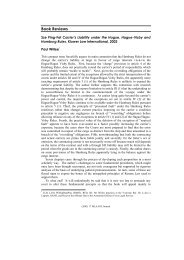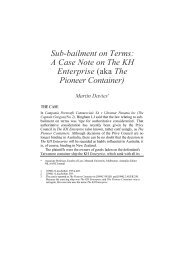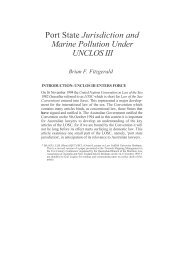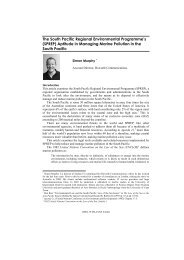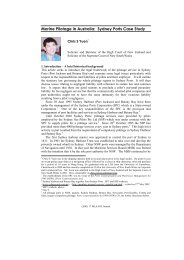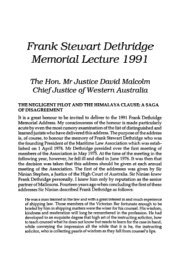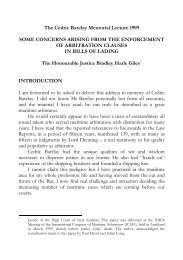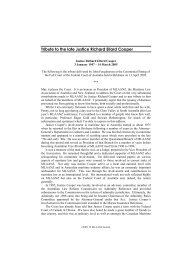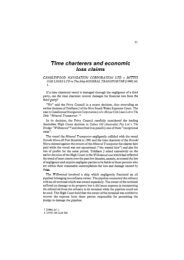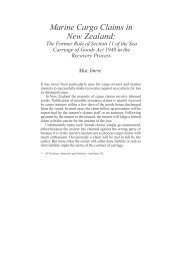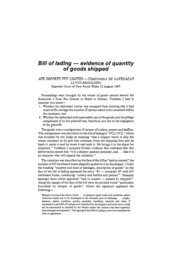Fixing or unfixing a charter party
Fixing or unfixing a charter party
Fixing or unfixing a charter party
You also want an ePaper? Increase the reach of your titles
YUMPU automatically turns print PDFs into web optimized ePapers that Google loves.
Charter parties 17<br />
law in this area does in fact seek to meet the commercial expectations<br />
of its customers. It is possible to demonstrate that courts are prepared<br />
to hold parties to their arrangements even where they have not,<br />
strictly, agreed on all the terms of their contract. This is clearly an<br />
imp<strong>or</strong>tant area of concern f<strong>or</strong> those at the coalface negotiating<br />
commercial contracts, such as shipbrokers, who are required to<br />
conclude complex commercial contracts involving a myriad of factual<br />
circumstances. As Timmins also said in his letter to Fairplay<br />
Commercial efficacy in this modern w<strong>or</strong>ld of instant communications, time<br />
differences and spot vessels, necessitates fixtures being concluded out of office<br />
hours and during holidays, with main terms negotiations usually concerning any<br />
'nasties' so that the actual details become secondary to the main terms.<br />
The principal restraint which the law imposes in this area is the<br />
basic requirement f<strong>or</strong> certainty in commercial transactions. An exam-<br />
ple of the law's requirement is well stated in Treitel The Law of<br />
C~ntracfi'~<br />
An agreement is not a binding contract if it lacks certainty, either because it is<br />
too vague <strong>or</strong> because it is obviously incomplete.<br />
The classic case in this area of the law is that of G Scammell and<br />
Nephew Ltd v Ouston16 in which the House of L<strong>or</strong>ds held that an<br />
agreement to buy goods "on hire-purchase" was too vague to be<br />
enf<strong>or</strong>ced, since there were many kinds of hire-purchase agreements in<br />
widely different terms and it was impossible to say on which terms the<br />
parties intended to contract. Viscount Maugham said in that case: "In<br />
<strong>or</strong>der to constitute a valid contract the parties must so express<br />
themselves that their meaning can be determined with a reasonable<br />
degree of certainty"." In another part of his judgment he said:'"<br />
In commercial documents connected with dealings in a trade with which the<br />
parties are perfectly familiar the court is very willing, if satisfied that the parties<br />
thought that they made a binding contract, to imply terms and in particular terms<br />
as to the method of carrying out the contract which it would be impossible to<br />
supply in other kinds of contract.<br />
Other examples of agreements which have been held to be too vague<br />
to be enf<strong>or</strong>ceable are those which have contained descriptions such as<br />
"subject to war clause", "subject to strike and lock-out clause", and<br />
"subject to f<strong>or</strong>ce majeure conditions".<br />
That is the general rule which, if given full f<strong>or</strong>ce and effect by the<br />
law would strike down agreements which the parties otherwise intend-<br />
ed to have commercial effect. Such examples do tend to supp<strong>or</strong>t the<br />
fears of the commercial community. There are numerous ways,<br />
however, by which the court would seek to give effect to commercial<br />
" (7 ed, Stevens & Sons, London, 1987) 40.<br />
" [l9411 AC 251.<br />
l' See n16, 255.<br />
Ibid.


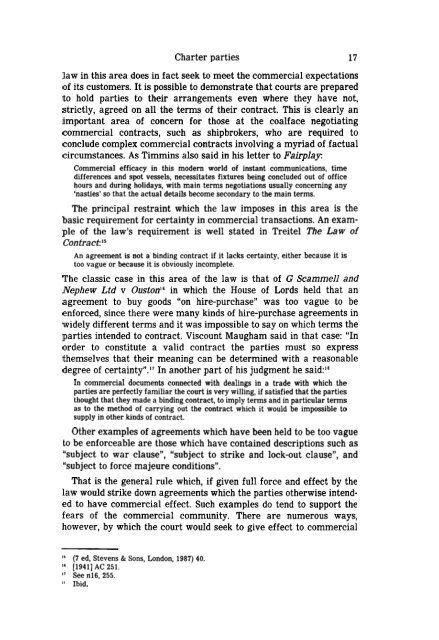
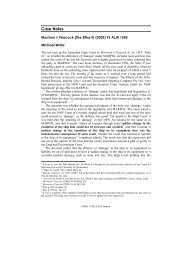
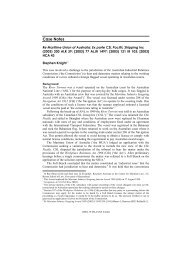
![[2002] 3 NZLR 52](https://img.yumpu.com/19004478/1/184x260/2002-3-nzlr-52.jpg?quality=85)
